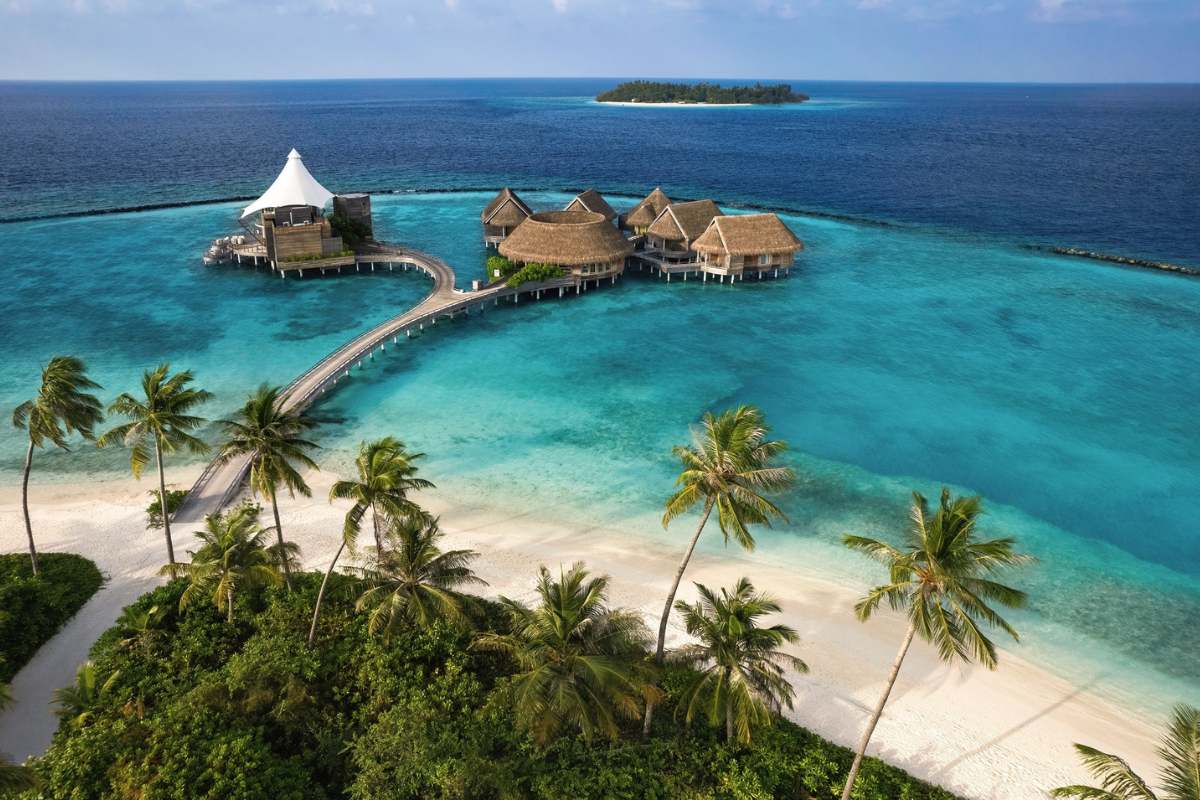
Unique activities abound in the Maldives, no more so than at The Nautilus. Some of the best of these activities are those inspired by conscious luxury – guest experiences that help protect our exceptional surroundings and secure a future for planet and people.
This March, we’ve planned some special activities for Earth Hour, the WWF’s iconic initiative begun more than 15 years ago. This year, they’ve expanded their mission from the original appeal for a global lights out to a call to create the “Biggest Hour for Earth”, encouraging people the world over to dedicate 60 minutes – and beyond – to environmental activism.
Our Earth Hour activities: 25th March 2023
In honour of Earth Hour, we celebrate our natural heritage and our commitment to sustainability by offering the following guest experiences:
- Nautilus Rising – our sundowner cocktail hour – will be held at the beach at Veyofushi Private Island instead of Naiboli Poolside Bar, where the sands will be beautifully illuminated by mass candlelight alone. Followed by a special dinner by the beach, at Thyme Restaurant
- Our marine biologist will give a guided walk on Madhirivaadhoo Island, sharing on the Maldives’ natural vegetation and The Nautilus’s upcoming sustainability projects.
- Our Young Wanderers will be treated to an environmental movie screening and fun crafts using recycled materials.
- At Naiboli Poolside Bar, a showcase of our coral reef restoration project with our maine biologist onsite to share more information.
- Solasta Spa will perform a 60-minute treatment of foot massage and meditation – by candlelight.

Beyond 60 minutes: Conscious luxury at The Nautilus
At The Nautilus, conservation is a 24/7 endeavour. It is key to not just our vision, but also our very livelihoods in hospitality: The beauty of the Baa Atoll is rooted in the natural world – from the crystalline seas to the shimmering marine life below – and it is this natural treasure that draws visitors to our shores time and again. Read about what we do year-round to care for our planet.
1. Coral Reef Rehabilitation
Coral reefs are one of the world’s most spectacular wonders. Teeming with rich, diverse, colourful life, these ethereal marine structures attract both sea creatures – seeking shelter and food – and human explorers. In the Maldives, we are blessed with some of the world’s most majestic coral reefs and atolls encircling our islands; indeed, they have made our archipelagic nation what it is: one of sheltered shores and bountiful waters that draw hundreds of thousands of visitors every year.
Beyond this, coral reefs are vital to ecological health, but under threat of destruction by industrial practices. Their preservation and restoration is thus of utmost importance, with one crucial conservation effort that of reattaching coral to the frame. As such, we invite guests to participate in this rewarding experience by adopting a piece of coral to monitor and enjoy online long after you’ve left The Nautilus.
2. Sea Species Conservation
Because the reefs, coves, lagoons, temperature and tides create such perfect conditions for sea life, the Maldives is blessed with an abundance of sea creatures, and a number of progressive initiatives have been implemented to protect these precious species. In an effort to preserve fish populations, fishing is prohibited in our house reef and lagoon, and we only source seafood from trusted local fishermen using the traditional methods that are truly sustainable and low impact. Our world-famous sea turtles are also very precious, and to help them thrive, we have special programmes dedicated to monitoring nesting turtles and escorting them safely back to their watery world.
3. Extensive Indigenous Planting
Besides the ubiquitous palm trees, there are a couple of hundred native plant species that call the Maldives home. One such plant is the dhun’gethi bush, which serves as an attractive privacy screen on our island, and so much more. Comprising over 20,000 individual plants, and stretching to total a length of 330m, our dhun’gethi hedge is the Indian Ocean’s largest living wall, playing an important role in reducing carbon emissions.
We’ve also planted kitchen gardens whose benefit is two-fold: Our carbon footprint is reduced, and our organic produce is at its freshest. Guests can look forward to signature dishes that incorporate home-grown hibiscus, lemongrass, mint and chilli. What’s more, all our plants are watered by rainfall or harvested grey water.
4. A Chemical- and Plastic-free Zone
Plastics and harmful chemicals simply don’t belong in such a paradisical part of the world, or anywhere across our beautiful blue planet. As such, everything we do – from cleaning and recycling – is geared towards this vision. Our cleaning and laundry products are chemical-free and ocean-approved, and our water and STP plant is specially designed to prevent contamination of the sea. Plastic straws and bottles are banned, bathroom amenities are provided unpackaged or in sustainable packaging, and wood products are either reclaimed wood or certified sustainable.
This March, join us in supporting Earth Hour,and create a sustainable world of your own making by getting in touch at [email protected].
